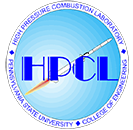High Pressure Combustion Lab
Dr. Richard Yetter, Director
104 Research Building East
University Park, PA 16802
Phone: (814) 863-6375
Email: ray8@psu.edu
Dr. Eric Boyer, Assistant Director
High Pressure Combustion Lab
University Park, PA 16802
Phone: (814) 863-2264
Email: jeb19@psu.edu

Facilities
Overview
The HPCL facility provides five test cells with 18-inch reinforced concrete walls, two test cells with 1/2" steel walls and three test areas for combustion measurements and diagnostics. Surrounding the test cells is a restricted area with a 15-foot high earth bank. A two-position Outdoor Test Facility sited for large labscale (currently up to 20 lbs of well characterized solid propellant) rocket motor testing is nearby. All test firings are conducted from remote control rooms. A separate location for fuel gas storage is located just outside the lab building. The lab location is sited outside the core campus area, and is suitable for testing of jet and rocket systems that generate significant noise levels.
Safety
The safety process at the HPCL is composed of many layers, ranging from compliance with government regulations at all levels to informal training and oversight within the lab environment. Policies established by agencies with oversight responsibilities are followed, and the HPCL is subject to inspections and audits by these organizations. Safe operation of research projects is ensured by both programmatic (regulations and procedures) and material (design and facilities) means.
Under Department of Defense (DOD) contracts, the HPCL is obligated to comply with safety guidance and requirements as set forth in DOD 4145.26-M, “DOD Contractors’ Safety Manual for Ammunition and Explosives.” Pre-award surveys and safety audits are conducted periodically by the Defense Contract Management Agency (DCMA) to ensure that the HPCL meets the requirements of DOD 4145.26-M and can safely and successfully complete the contracts.
The explosive storage facilities near the HPCL conform with Bureau of Alcohol, Tobacco, Firearms, and Explosives (ATF) regulations as specified in 27 CFR 55. A "Type 20 - Manufacturer of Explosives" license is maintained to facilitate research with energetic materials.
Storage magazines are also licensed by the Pennsylvania Department of Environmental Protection under 25 PA Code Chs. 210 and 211 and are subject to periodic inspections. All inspections have resulted in satisfactory evaluations.
In addition to external agencies, there are internal Penn State policies governing lab safety and operation. The HPCL works closely with Penn State's Environmental Health and Safety (EHS) on topics such as hazardous and chemical waste handling, fire safety, and X-ray operation. EHS requires and provides training on these items. Again, the HPCL is subject to periodic inspections and has no outstanding safety issues. Through their policies and inspections, EHS also enforces applicable US Environmental Protection Agency (EPA) and Occupational Safety and Health Administration (OSHA) regulations.
Finally, there is an extensive internal safety program in place at the HPCL. The HPCL's safety manual is reviewed and then followed for all operations at the lab. All projects working with ammunition, explosives, and propellants have a hazard analysis conducted during the design and planning phase, which is updated as warranted while the project progresses. Standard operating procedures (SOPs) are developed based on prior experience, best practices from other facilities, and items identified through the hazard analysis. Safety seminars are given as appropriate as refreshers on current practices or to address new issues. Self-audits are performed frequently.
Security
Penn State export compliance policies, procedures and guidelines which are designed to meet or exceed the requirements of the various federal laws governing the export of goods, technology, and information, including compliance with ITAR, EAR and OFAC regulations are strictly followed at the HPCL (see Export Compliance). DoD contracts requiring compliance with DFARS 252.204-7012 (Safeguarding Covered Defense Information and Cyber Incident Reporting) have been executed and operations at the facility are compliant with NIST SP 800-171 (Protecting Controlled Unclassified Information in Nonfederal Information Systems and Organizations).
